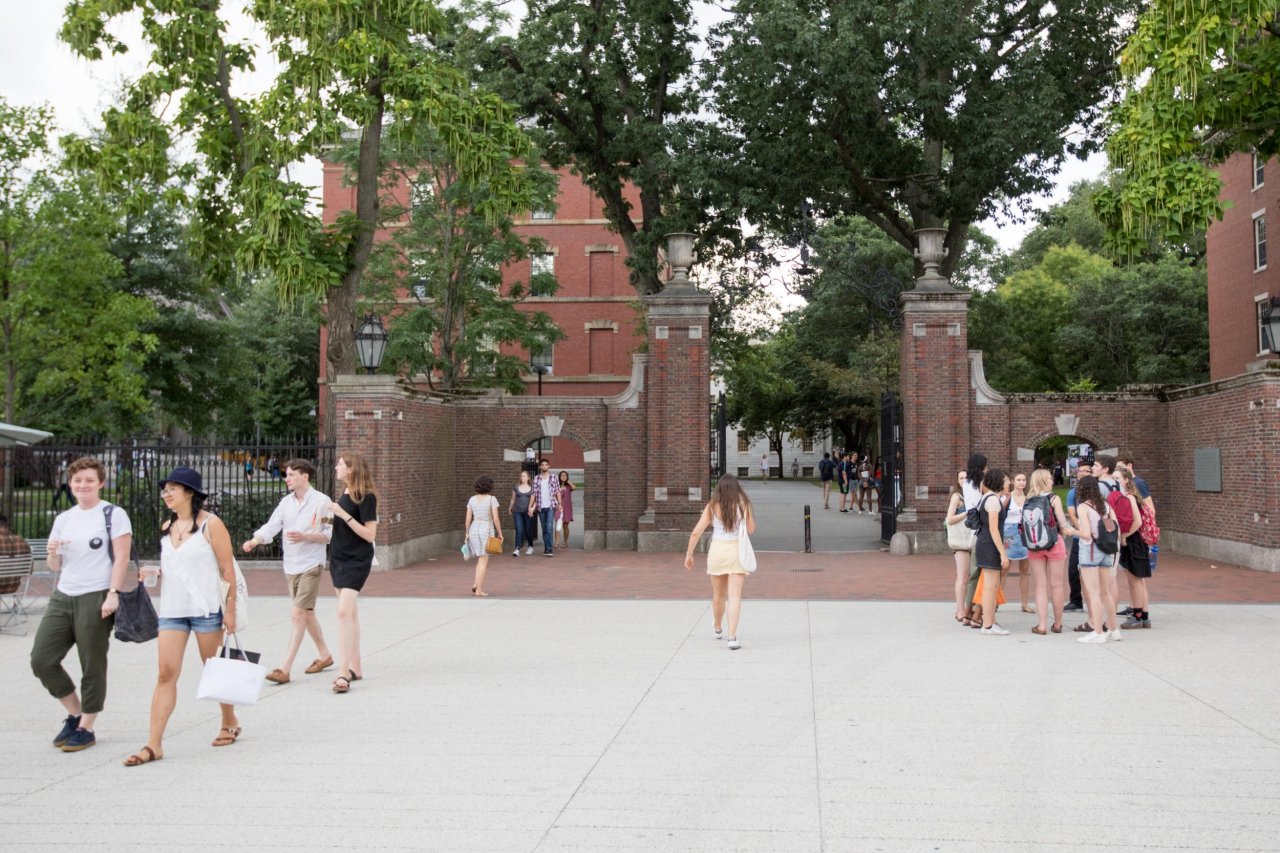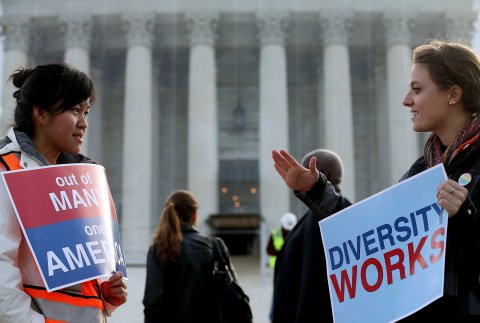
Racketeering, millions of dollars, celebrities, the Ivy League: The alleged conspiracy by the wealthy and well-connected to ensure their children's admission into elite colleges goes beyond Hollywood scandal. The story inflamed already smoldering concerns about the ways that money corrupts the supposedly meritocratic college admissions process. If any aspiring students across America—and around the world—still believed that every applicant had the same shot, they and their parents now know for certain that that's not the case. There are already calls for reform.
But the process of taking privilege out of the system might also bring an end to something else: Affirmative Action.
Race-based affirmative action, a concept first introduced in the 1960s during the civil rights movement, has steadily been losing public support to alternative, race-blind methods of college admission, A February Pew Research Center Poll indicated that 73 percent of Americans did not think colleges and universities should consider race or ethnicity when making decisions about student admissions. Over 60 percent of black respondents and 65 percent of Hispanic respondents did not want race to be a factor in admissions.
The Trump administration has also attacked the system; a conservative Supreme Court will likely soon hear a case about Harvard, accused of using racial screening to limit the number of Asian-American students accepted. But the alleged scheme by more than 50 celebrities, business executives and rich parents to fix SAT scores and bribe athletic coaches to get their kids into college could be what finally kills the controversial policy.
"People are using this as an argument against affirmative action because these rich students had their own type of advantages," said Ivory Toldson, a Howard University professor and editor-in-chief of the Journal of Negro Education. "They're saying we need to level the playing field and that also means ending race-based admissions."
The now-intense public scrutiny of the system is proving to be a watershed moment for the admissions process. More than anything, the scandal illuminates the fundamental unfairness that pervades American universities. Americans idealize U.S. colleges, and so do the tens of thousands of foreign students who apply each year—many of them participants in corrupt application systems in their own countries.
University officials and politicians alike are now under pressure to clean up the process. Some education analysts are considering possible alternatives—including lotteries. What better way to neutralize the influence of nonquantifiable factors than to nix them all?
The most obvious target for reform is the legacy preference; applicants with family members who attended the school to which they are applying have an advantage—and if the parents are generous alumni, even better. Legacies tend to be white and relatively well-off. At Yale, one of the universities touched by the scandal, 12 percent of the students on campus are legacies.
There's also public support for an end to legacy admissions; nearly 70 percent of all Americans did not want schools to factor legacy into admissions decisions, found Pew. A serious attempt at reform, said Richard Reeves, senior fellow at the Brookings Institute, could eliminate all legacy admissions.
But, he added, if you're going to work toward a system of total meritocracy, affirmative action might have to go as well. "It's this weird sort of stalemate," he says. "One of the reasons people are reluctant to address legacy is because there is this unspoken deal where we have legacy but also affirmative action. I think we're reaching a tipping point and the whole system will come under scrutiny, and rightly too."
Affirmative action and legacy preferences are tied together politically, said Dan Golden, Pulitzer Prize winner and author of The Price of Admission, the book that first reported Jared Kushner's father gave millions to Harvard ahead of his acceptance. "In the states where affirmative action has been banned through court decisions or referenda, legacy preferences drop too."
After Texas A&M announced in 2003 that it would no longer consider race in admissions, it also ended preferential treatment for legacies, citing the "obvious inconsistency'' of giving preference to relatives of alumni in a supposedly merit-based system. The school saw a 114 percent increase in diversity over the next 13 years.
Campus officials said that the success was due to a combination of using hard data for admissions and establishing connections with underserved schools in Texas. The university decided to admit all Texas students who ranked in the top 10 percent of their class, no matter how competitive the high school. "Every student who is at A&M must know…that he or she and all students here have been admitted on personal merit," said former A&M president Robert Gates.
At the same time, A&M sent recruiters to high schools in East and South Dallas, predominantly black and Hispanic areas, to build relationships with students and encourage them to apply. At W.W. Samuell High School in South Dallas, where 90 percent of the students are on public assistance, that outreach paid off. "Everyone wanted to attend A&M," said Thelma Gonzalez, the school's college adviser, to The Texas Tribune.
"Affirmative action is not working hard enough to balance the disproportionate way college admissions are stacked to advantage wealthy, white students," said Richard Kahlenberg, senior fellow at The Century Foundation and the author of The Remedy: Class, Race and Affirmative Action. "One of the interesting things about the top 10 percent rule as a form of affirmative action is that it did bring in a lot more economic diversity and racial diversity than the old-style use of race-based admissions."
Texas, Florida and California have all replaced their affirmative action programs with systems that guarantee a certain percentage of top high school students admissions into their public universities, with varying degrees of success. All schools, however, found success increased when the programs were coupled with significant outreach to disadvantaged student populations.
"I don't think there's any reason to think a version of the top 10 percent plan couldn't work in every state," said Kahlenberg. "The admissions system is tilted toward the advantaged, and the genius of the top 10 percent plan is it took out those advantages.... It didn't do it completely, but it's a start."
Toldson, at Howard University, agrees that the 10 percent rule can aid students who don't go to top high schools and might not have the resources afforded to wealthier students. "One of the things that I've observed from speaking at high school graduation, and I've spoken at schools considered the worst of the worst, is that their valedictorians and scholarship recipients and student leaders are great and could survive anywhere," he said. "And when they do gain admittance into universities, those students have done well, they haven't shown any academic deficiencies."

Currently, the minority students who gain access to top schools tend to come from high-income, privileged backgrounds. At Harvard University, 71 percent of the school's black and Latino students come from wealthy backgrounds, found Kahlenberg.
"The current system of preferences encourages strategic behavior rather than meritocracy," said Richard Sander, a professor of law at the School of Law at the University of California, Los Angeles, and a critic of affirmative action. Just as wealthy parents work to game the admissions system, admissions officers work to game affirmative action guidelines.
But many scholars disagree with the thought that a truly meritocratic admissions system is contingent on ending affirmative action. "Affirmative action is a policy that is designed to expand opportunity and legacy admission is designed to hoard opportunity," said Natasha Kumar Warikoo, a professor of education at the Harvard Graduate School of Education and author of The Diversity Bargain: And Other Dilemmas of Race, Admissions, and Meritocracy at Elite Universities.
"It's problematic to put them in the same category. Critics say we should get rid of all of that stuff, and have a meritocracy, but we know that the outcome of admissions to the most elite colleges is an outcome in which disadvantaged groups are systematically underrepresented. Colleges should figure out ways to change that rather than focusing on legacy."
It's not that affirmative action doesn't work, said Warikoo, it's that it does not go far enough in addressing inequality so pervasive that by the time a student is a high school senior, it's often too late to redress. Pipeline programs that encourage and aid underprivileged students from a young age might be more effective.
Unlike Reeves, Warikoo is not optimistic about potential systematic changes. "I don't foresee any dramatic changes to legacy admissions," she said. "Sadly, the only thing that might be forced to change is affirmative action."
Warikoo was referring to Students for Fair Admissions v. Harvard, a lawsuit that questions whether Harvard University violated the Civil Rights Act by potentially discriminating against Asian-American applicants. The suit, currently being heard in a Massachusetts District Court, touches on key aspects of affirmative action: The plaintiffs argue that admissions officers must remove race from their criteria to give Asian-Americans a fair chance of acceptance. The case is expected to work its way to the conservative-leaning Supreme Court soon.
"Eliminating race-based affirmative action and implementing policies that would ensure a unique freshman class without using race is clearly the will of the American people," said Edward Blum, a 67-year-old man who has long fought to end affirmative action and is president of Students for Fair Admissions.
"There are race-neutral admissions policies that can be implemented that will result in a unique, well-balanced freshman class with kids from different backgrounds and geographic areas," said Blum. If schools eliminated preferences for legacies, children of faculty and athletes, and sought out students from modest socioeconomic backgrounds, he said, there would no longer be the need to use racial classifications and preferences in the admissions process.
The Harvard case, however, would seek to end affirmative action without an alternative in place.
"Make no mistake about it—the engineer behind this litigation is intent on sowing divisiveness amongst communities of color in an effort to dismantle diversity programs and civil rights protections that benefit all people of color," wrote Sarah Hinger, a staff attorney at the American Civil Liberties Union Racial Justice Program. "Not talking about race doesn't erase discrimination; it reinforces the privileges of white applicants by ignoring the ways in which deep-seeded [sic] structural racial inequality impacts individuals."
The allegations of outright fraud that recently became public bring up real questions of problems with the current admissions system, said Toldson, but it's important to be careful of "Trojan horse" arguments that could further disadvantage minority students.
Still, the admissions scandal resonates with middle-class Americans, said Reeves. "It's such a different world where fame and wealth ensure different treatment. These institutions are not serving most Americans, and this story is an egregious reminder of that. I hope this wakes us up to what fairness looks like."
Political momentum is already building. Democratic Senator Ron Wyden of Oregon introduced a bill this week that would prohibit college donors from receiving a tax break while a family member is enrolled there. "Middle-class families don't have access to this back door for their children," the senator said in a statement. "If the wealthy want to grease the skids, they shouldn't be able to do so at the expense of American taxpayers."
Illegal admission rings, after all, are exceedingly rare. What is far more prevalent is the legal leg up that wealthy teenagers have over their less privileged peers. After arresting those participating in the recent scam, U.S. Attorney Andrew Lelling of Massachusetts explained why these parents were in trouble. "We're not talking about donating a building so the school is more likely to take your son or daughter," he said in a statement. "We're talking about deception and fraud, fake test scores, fake athletic credentials, fake photographs, and bribed college officials."
It's telling that Lelling did not contrast what happened with a student who applied and gained admission through their own merit, said Reeves. "He's saying one way of bribing your way into a place is wrong, but the other way is alright."
But even if legacy and affirmative action admissions were entirely eliminated, constructing a purely meritocratic system would be difficult. It's well-known that elite colleges have more qualified students applying than seats to fill. Former Harvard President Drew Faust has said that "we could fill our class twice over with valedictorians," all of whom would arguably do well at the hallowed institution.
So how do admissions officers choose between those students without considering unmeritocratic factors? A lottery system could be one answer, Peter Stone, a professor of political science at Trinity College in Dublin, has suggested. In Access to Higher Education by the Luck of the Draw, he writes that when two students are similar academically, "lotteries guarantee that irrelevant (i.e., unfair) reasons will hold no sway over the tie-breaking process."
Other systems, writes Stone, are unreliable and arbitrary. "Fairness thus requires random selection under the right circumstances, and these circumstances frequently occur in the realm of higher education admissions."
Reeves is also in favor of a lottery. "I was recently speaking with the president of an Ivy League school and he gave me what he considered the baseline grade-point average and SAT scores for admissions. But, he told me, 'about 10 times as many people apply with those merits than they can admit.'" They're all qualified applicants, Reeves added, so "pull their names out of a hat and run a lottery."
The best part of a lottery system is that no one is left wondering why they weren't accepted. "Everyone knows why they won and everyone knows why they lost," says Reeves, "instead of having a sneaking suspicion that they were admitted because they played the oboe or their dad knew someone or because they were black or Hispanic."
Warikoo is in agreement. "There is already so much chance baked into the admissions system, a lottery would just expose that," she said. "People currently think that if you get into Harvard you must be better than everybody else, but those are false understandings. There are tons of amazing people who don't get in."
But no college in the United States has attempted such a system, and perhaps with good reason, said Golden. "Whatever criteria you set up, people will find a way to game it," he said. "If there were a lottery based on grades, high schools would be eager to give students better grades."
In 1997, after Texas governor George W. Bush signed into law the decree that automatically granted Texas high school students in the top 10 percent of their class admission to all state-funded universities, Golden said he visited a high school that had managed to count 15 percent of students as being in the top 10 percent.
Even if schools don't game the system, Golden predicted, universities would never go for the idea. Why pick at random when you can choose a legacy student whose parents have deep pockets? "American universities are businesses," she said. "They're looking to make as much money as possible, and sometimes when it comes to a collision between academic quality and financial gain, greed wins."
Frederick Hess, director of education policy studies at the American Enterprise Institute, argues that the idea of the lottery thought experiment isn't to actually make a radical change, but to expand the minds of what is possible in higher education admissions. "Part of the way out of some of these frustrations is surfacing these more creative, less conventional ideas, and talking about them. That's what we're trying to do here," he said.
One way to diminish the role of greed is to address the anxiety that rewards it. The problem with elite institutions is not in their admissions process, said Wilfred McClay, the G.T. and Libby Blankenship chair in the history of liberty at the University of Oklahoma. "I'm not going to pretend there isn't a difference between Harvard and Suffolk County Community College, but I think this situation where the Supreme Court is made up entirely of Harvard or Yale Law School graduates is wrong. The thing driving the current scandal seems to be that ultimately parents were willing to do anything to game the system to get their kids these advantages, not because the education was better but because the legitimation of social position would be better."
All over the world, wealthy parents find ways to get a brand-name American diploma for their child. "Students from China go through really sophisticated test prep and intermediaries to get accepted to our schools," said Golden. "They have admissions advisers writing their essays and are sometimes able to present themselves as better candidates than they really are. The colleges take these kids because they pay full tuition and because they want to open lucrative international branches of their schools that are subsidized by the host country."
Just days after the celebrity admissions scandal exploded into view, another slipped under the radar. Federal authorities arrested five Californians for allegedly helping Chinese students obtain visas by taking their English language tests for them. Over 40 students were able to attend schools like University of California, Los Angeles, and Columbia University because of the alleged scheme.
"In a perverse way, the desperation of these rich parents testifies to the value of a degree from an elite college," said Golden. "In what other country would parents go through such criminal and outrageous lengths to get their children into college? It's a weird backhanded tribute to the mystique and allure of an American college degree."










